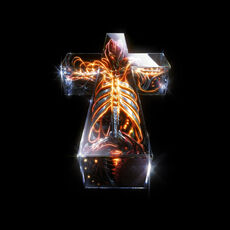The story behind Justice began with a misunderstanding. After the release of their remix of Simian’s " Never Be Alone " in 2003, which lit up many dance floors at the time – and over the past 15 years – most people were under the impression that they were DJs. The duo was immediately associated with the dance music/club scene, and their signing with Ed Banger Records, which had just launched the career of Pedro Winter, led to further confusion. The now ex-manager of Daft Punk, invited by So Me, the label’s artistic director, had come for dinner at the home of Gaspard Augé, who had him listen to the demo of what came to be titled " We Are Your Friends. " He loved the track and signed him the very next day, for what would become his second release. It also was only the second track Xavier and Gaspard would ever compose in their careers, undoubtedly making it a bit too soon to stamp the dance music label beside their names.
The ploy was working, however, so Justice played along. Invited for their first DJ set at the Summer of Love party (held by David Blot and Fred Agostini after the success of their Respect du Queen parties), they essentially figured out how to work the turntables as they went along. " In electronic music, when you come out with a new record, promoters assume you’re a good DJ, which obviously wasn’t the case… " Xavier de Rosnay describes. " But we were asked pretty quickly to play at parties. It was a natural progression, although Gaspard and I didn’t come from that background at all. We had never had turntables at our place, so we truly learnt by doing. And since we earned a much better living doing that, we didn’t even think twice about it. "
At the height of the electroclash movement – when muddled, saturated sounds were in vogue, with artists like Felix Da Housecat, Vitalic, DJ Hell, Miss Kittin, and The Hacker – the duo quickly found themselves a family amidst these DJs, first with Ed Banger’s growing cavalry (including SebastiAn, Cassius, and Uffie), then internationally with Erol Alkan, whose rock/techno mixes that tested the limits of tastefulness won them over: " We really identified with them, " Xavier recalls. " The kind of techno DJing that tells a story doesn’t appeal to us at all, although we totally respect it. The only influences we had in terms of our DJing were Funkmaster Flex and his predecessor Grandmaster Flash: a new track every minute and a half, and it’s no big deal if you hear it coming. Something that’s a little off, but in an interesting way. "
Within the DJ scene, Justice’s other mentors were the Flemish brothers Dewaele, a.k.a. Soulwax/2ManyDJ’s, who captivated an entire generation with their mastery of the mash up, which they developed on the mixtape As Heard on Radio Soulwax Pt. 2: " We felt like there was something that was too formulaic about the electronic music scene at the time, " Gaspard explains. " You had to have a well thought-out, polished set. An expressway. Since we didn’t listen to much electronic music, we really liked the 2ManyDJ’s school of thought because there were no imperatives in terms of style. You could play whatever you wanted. Their mash-up record opened everyone’s mind to a new way of doing things. We came on the scene when they were already well-established, so it’s true that they kind of acted like big brothers to us. We realized that people could enjoy themselves just as much, if not more, if you played things that were radically different from one another. "
After a year and a half of watching the hype around them rise, as well as a slew of remixes, in 2005, Justice released their second track " Waters of Nazareth, " which Pitchfork would describe as " noisy and fucked. " A funk groove, but without the low frequencies, just the middle and high ones, and with ear splitting percussion. A noise manifesto whose first victims were left perplexed, between the friends who thought there was a problem with the pressing of the record, and the sound technicians who kept checking whether the turntables were plugged in properly whenever Justice would play the track at festivals. As a result, the group’s image was a confusing one – which was the point – and even more so with the April 2007 release of the single " D.A.N.C.E. " a disco trip with children’s choirs whose haphazard music video made its way around the world. Three months later, Justice’s first album † (Cross) finally hit record stores and became a smash hit, most notably with the tracks " Genesis, " " Phantom, " and " Stress, " backed by a transgressive, 7-minute long music video directed by Romain Gavras, which shows a violent raid in Paris by a group of kids from the cités, Parisian housing projects.
Justice - D.A.N.C.E. (Official Video)
JusticeAfter their mix nearly stripped them of the DJ label, it was denied by the prestigious English dance music institution Fabric the next year. Justice then found their music denoted as " violent " with the British press describing them as " Daft Punk disguised as Iron Maiden " and " dance music’s response to metal. " This was an image that Justice would try to shake off with their second studio album (after the live album A Cross the Universe) in 2011. " Our dogma was to avoid the first album’s aggressive sound, in order to establish a closeness with the music. " Xavier explains. Although they own up to their dramatic side " We love being emphatic and exaggerating emotions. Whether it’s melancholy or euphoria, we try to never be lukewarm " , they resist this sentiment of violent sound. " A track doesn’t need to be aggressive in order to be powerful. Since the first album, we never felt the need to do things like that again. It was a premise that made sense at the time. That sort of punk side came from our limitations. If we did it again now, we’d feel like old guys with ponytails trying to act like punks… "
The Parisians, who’ve never had a uniform fanbase, had a little something for everyone on this second album, with a first part that was along the same lines as the previous record, before taking a disco/pop/rock turn on the second, which felt as if they’d thrown Moroder, Yes, and Michel Berger all in a basket. " Some people might listen to our music in a one-dimensional way. But between those who come only for the saturated tracks, and those who prefer the disco stuff like ' D.A.N.C.E. ' that’s where we stand. We don’t feel like AC/DC, who’ve never stopped making the same track over and over again. " At the time, the duo considered themselves to be completely free from their fans’ expectations. " After Waters of Nazareth, D.A.N.C.E.’ and We Are Your Friends, we knew that people didn’t know what to expect from us anymore, and that gave us a kind of freedom. We didn’t really feel any pressure because we didn’t know what people liked on the first album. For us, it was just about evolving our music and keeping the same emotions as on the first. Nothing about this album was supposed to be avant-garde, it was just pure emotion for us. We grew up with MTV, so we don’t have specific tastes. We just wanted to make a modern pop album. "
Like Daft Punk, Justice ultimately became a pop group. And as these two French duos were met with so much success, it’s because, deep down, they were tuned into the pop genre, which the younger two demonstrate on their latest album Woman, released in 2016, and on their customary live counterpart – reworked in the studio – Woman Worldwide. Driven by the singles " Safe and Sound " and " Randy, " with choirs provided by the London Contemporary Orchestra, Woman displays the epic side of electro, the hedonism of disco, and the simplicity of pop. " The only thing we like about electronic music is its physical side, its brutality. Whereas with pop, what we like are the harmonies, " Xavier de Rosnay specifies. " Our initial ambition was to produce a choral record, where the melodies and the vocals are intended to be sung by multiple voices at once. But beyond that, we’d like for this album to be listened to by groups of people as well, for it to create communion between as many people as possible. That’s why our songs are in English, the universal language of pop music. "
With this record that contains " the simplest structures " they’ve ever composed – which Pedro Winter dreams of handing over to Bon Iver to remix – Justice fully step into their love for disco and pop, although they feel almost completely out of touch when they listen to Kanye West : " We tend to respect the song format of verse, chorus, bridge…but it’s almost become anachronistic, " as well as the latent romanticism that has followed them throughout their career: " Music stays magical as long as you don’t know how it works, " Xavier concludes. " A good song is made up of frequencies that go well together according to the laws of physics. I’ve been tempted multiple times to learn more, to take classes or to read works of music theory. In ten pages, the mystery is revealed: why a song is sad or happy, how a chorus should be structured…everything we do by instinct becomes disappointing, depressing, even, when it becomes quantifiable. I don’t want to know, I want to stay naive. "
Quotes taken from interviews for Trax, Les Inrocks, Numéro, LCI and Konbini.







